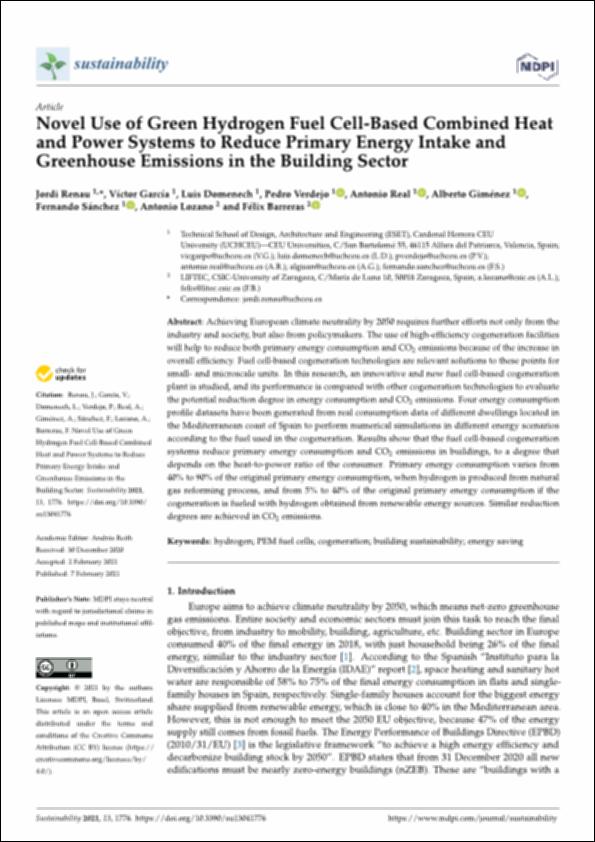Por favor, use este identificador para citar o enlazar este ítem:
http://hdl.handle.net/10637/12888Novel use of green hydrogen fuel cell-based combined heat and power systems to reduce primary energy intake and greenhouse emissions in the building sector
| Título : | Novel use of green hydrogen fuel cell-based combined heat and power systems to reduce primary energy intake and greenhouse emissions in the building sector |
| Autor : | Renau Martínez, Jordi García Peñas, Víctor Doménech Ballester, Luis Verdejo Gimeno, Pedro Real Fernández, Antonio Giménez Sancho, Alberto Sánchez López, Fernando |
| Materias: | Electroquímica.; Electrochemistry.; Buildings - Environmental aspects.; Energy conservation.; Edificios - Aspectos ambientales.; Ahorro energético. |
| Editorial : | MDPI |
| Citación : | Renau, J., García, V., Domenech, L., Verdejo, P., Real, A., Giménez, A., Sánchez, F. et al. (2021). Novel use of green hydrogen fuel cell-based combined heat and power systems to reduce primary energy intake and greenhouse emissions in the building sector. Sustainability, vol. 13, i. 4 (07 feb.), art. 1776. DOI: https://doi.org/10.3390/su13041776 |
| Resumen : | Achieving European climate neutrality by 2050 requires further efforts not only from the industry and society, but also from policymakers. The use of high-efficiency cogeneration facilities will help to reduce both primary energy consumption and CO2 emissions because of the increase in overall efficiency. Fuel cell-based cogeneration technologies are relevant solutions to these points for small- and microscale units. In this research, an innovative and new fuel cell-based cogeneration plant is studied, and its performance is compared with other cogeneration technologies to evaluate the potential reduction degree in energy consumption and CO2 emissions. Four energy consumption profile datasets have been generated from real consumption data of different dwellings located in the Mediterranean coast of Spain to perform numerical simulations in different energy scenarios according to the fuel used in the cogeneration. Results show that the fuel cell-based cogeneration systems reduce primary energy consumption and CO2 emissions in buildings, to a degree that depends on the heat-to-power ratio of the consumer. Primary energy consumption varies from 40% to 90% of the original primary energy consumption, when hydrogen is produced from natural gas reforming process, and from 5% to 40% of the original primary energy consumption if the cogeneration is fueled with hydrogen obtained from renewable energy sources. Similar reduction degrees are achieved in CO2 emissions. |
| Descripción : | Este artículo se encuentra disponible en la siguiente URL: https://www.mdpi.com/2071-1050/13/4/1776 Este artículo pertenece al número especial "Sustainable building and indoor air quality". En este artículo de investigación también participan: Antonio Lozano y Félix Barreras. |
| URI : | http://hdl.handle.net/10637/12888 |
| Derechos: | http://creativecommons.org/licenses/by/4.0/deed.es |
| ISSN : | 2071-1050 (Electrónico). |
| Fecha de publicación : | 7-feb-2021 |
| Centro : | Universidad Cardenal Herrera-CEU |
| Aparece en las colecciones: | Dpto. Matemáticas, Física y Ciencias Tecnológicas |
Los ítems de DSpace están protegidos por copyright, con todos los derechos reservados, a menos que se indique lo contrario.


